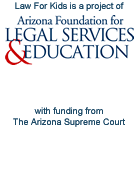 |
Speak Up! - View Question #17142 |
 printer friendly version printer friendly version
Question: I write a lot of poems and stories and I was wondering, if I post my poems somewhere are they protected or do I have to get them compyrighted somehow?
Answer: To answer this question we must answer the following three questions:
1) Is a poem or short story copyrightable?
2) If so, what benefit does a copyright provide me?
3) What are my options for enforcement of the copyright?
Short Responses:
All creative works are able to be copyrighted, and this includes short stories and poems. (17 U.S.C. § 103(1)). Minors may claim copyright, but state laws may regulate the business dealings involving copyrights owned by minors.
Copyright lasts for the life of the author plus another 70 years. (17 U.S.C. §302).
Something is copyrighted when it is put in a ‘fixed format’ – this means writing it on paper or making a recording. When you register a copyright, you mail it into the government office. Benefits of registration include proof of when a work is copyrighted and ownership. A big part of suing people when they steal your work is proving that you wrote it before they did. In other words, you have to show that you are the real author and not the thief. There are allowances for money damages if your copyright is registered. (17 U.S.C. § 411).
Keep in mind that you cannot copyright ideas. For example, there are lots of stories about a girl and a boy falling in love even though their families hate each other: “Romeo and Juliet,” “West Side Story,” and many others. You can only copyright your original text of a story, not the idea behind the story.
Copyright law has changed over time, and is based in the Constitution of the United States (Article 1, Section 8) which gives Congress the power "To promote the Progress of Science and useful Arts, by securing for limited Times to Authors and Inventors the exclusive Right to their respective Writings and Discoveries." Though the meaning of "Science and useful Arts" had a different meaning at the time the founders wrote the Constitution, modern copyright law is primarily governed by a specific law (known as the Copyright Revision Act of 1976). Today's Copyright law covers the following works:
(1) literary works;
(2) musical works, including any accompanying words;
(3) dramatic works, including any accompanying music;
(4) pantomimes and choreographic works;
(5) pictorial, graphic, and sculptural works;
(6) motion pictures and other audiovisual works'
(7) sound recordings; and
(8) architectural works.
So what does all of this mean? It means that by statute, (according to Congressional action) the copyright will protect writings such as poetry and short stories, which fall under "literary works," in (1) above. There are other sections that define what is copyrightable, but that is beyond the scope of this question.
Current copyright law protects a work for the life of the author plus 70 years (assuming it is not owned by a Corporation) (17 U.S.C. §302). Copyright gives the owner of the copyright the exclusive right to reproduce the work, to prepare other works that are based on this one (such as writing a sequel to a successful movie), and the right to distribute copies by sale, leasing or lending. (17 U.S.C. § 106). In other words, the person who owns the copyright has the right to prevent everyone else from reproducing, writing sequels, or otherwise using the work during the life of the copyright.
Copyright Infringement is a legal term that generally means someone has uses a work protected by a copyright without the permission of the owner. The owner of the copyright can sue the person using the work. Actions can be brought concerning infringement of copyright (17 U.S.C. §§ 501, 502, 504). These sections of law allow for the potential of injunctions (where the law forces one to stop doing something; such as stopping one from using something on their website) or damages. For all intents and purposes, one must register their copyright to be able to recover damages. (17 U.S.C. § 411).
Final Note: Laws concerning the web are currently in flux, and in addition, regardless of your rights, placing something on the web means that in reality, enforcing your rights could be costly and or difficult.
|


















